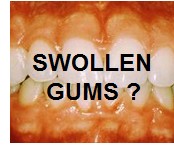Swollen gums are usually tender and uncomfortable. They can make eating difficult and painful.
 There are many reasons why you may have swollen guns. As the years go by, gum disease can be a very likely cause, assuming you have no other dental damage or structural problems.
There are many reasons why you may have swollen guns. As the years go by, gum disease can be a very likely cause, assuming you have no other dental damage or structural problems.
To get details about a natural treatment for swollen gums caused by poor dental hygiene or gum disease click here > > Swollen Gums Treatment
Problems Associated with Swollen Gums
Swollen gums, also known as gingival swelling, can significantly impact oral health and overall quality of life. People experiencing this condition often report discomfort, sensitivity, and difficulty performing everyday tasks like eating and speaking.
Difficulties in Eating
Swollen gums can cause:
- Pain and Sensitivity: Chewing can become uncomfortable, especially when consuming hot, cold, or spicy foods.
- Bleeding Gums: Some individuals may notice their gums bleeding while eating or brushing.
- Restricted Diet: To avoid pain, people might limit their diet to soft foods, potentially reducing nutritional intake.
Probable Causes of Swollen Gums
Swollen gums are usually a symptom of underlying dental or systemic issues, including:
- Poor Oral Hygiene:
- Plaque and tartar build-up can irritate gums, leading to gingivitis, the first stage of gum disease.
- Left untreated, gingivitis can progress to periodontitis, causing severe gum inflammation and damage.
- Nutritional Deficiencies:
- Lack of vitamin C (scurvy) or other essential nutrients can weaken gums and lead to swelling.
- Hormonal Changes:
- Pregnancy, puberty, and menopause can increase gum sensitivity and swelling due to hormonal fluctuations.
- Infections:
- Bacterial, viral, or fungal infections can cause gum inflammation. For example, herpes simplex can lead to acute gingivostomatitis.
- Irritation from Dental Products or Procedures:
- Allergies to toothpaste or ill-fitting dental devices like braces or dentures can irritate the gums.
- Systemic Health Conditions:
- Diseases such as diabetes or autoimmune disorders can increase susceptibility to gum inflammation.
- Medications:
- Certain drugs, such as calcium channel blockers or antiepileptics, can cause gum overgrowth and swelling.
Addressing the Issue
Treating swollen gums involves identifying the cause, maintaining excellent oral hygiene, and seeking professional dental care. Dentists may recommend:
- Proper brushing and flossing techniques.
- Antimicrobial mouthwash to reduce bacteria.
- Treating underlying conditions or infections.
If you’d like details about a successful natural treatment for swollen gums, caused by the onset of gum disease, or poor dental health, follow this link > > Relief from Swollen Guns
In severe cases, professional cleaning or surgical intervention may be necessary. If you experience persistent swollen gums, it’s essential to consult a dentist to prevent complications.